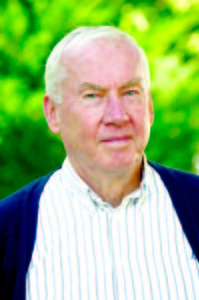Small World: A new generation moves in
By Henry Precht
BN Columnist
Last week, I interviewed two new graduates of a west coast college, Gus, sometimes of Harrison, and Daisy from New Mexico. Both emerged with superlative records; both are exploring new futures as beginning teachers. Here follows an abbreviated version of what they had to say.
I started by asking what four years ago they hoped to achieve at college and what anxieties weighed upon them?
G. “There are two aspects — the academic and the social and maybe the second takes over: new friends, new situations, separation from family and old friends. Then you discover the challenge of intellectual engagement, the attraction of learning new facts and concepts.â€
D. “At the start I felt I had to rely on myself; I didn’t realize that I could turn to others for help. I started out on a pre-med program, but decided I couldn’t deal with the heavy responsibility that medicine demands. Being on my own, however, meant I was constantly testing myself. It was a big change when I learned I could turn to my friends for help.â€
H. “What differences did you find living in California?â€
G. “The absence of seasons definitely influences character. Every day out there — the same perfect weather, sunny, welcoming. It slows people down. You can’t not be relaxed about life. Once, when I was worried about work due for an 8:30 class, friends came by at 10 p.m. and insisted that I go with them for a swim. We did; I made class. Life went on.
D. “Moving from New Mexico wasn’t a big shift for me. Each coast deals with different anxieties, but they aren’t radically different. Driving across country, however, you see what an immense place and how richly diverse our nation is. It does make you feel patriotic.â€
H. “And the orientation of the students — for the most part left, right or indifferent?â€
G. & D. “The dominant group is definitely the radical left. They assert their extreme views and have no patience for the thoughts of others. There are a lot of students without opinions, apathetic, who can’t be heard because the radicals are all controlling. For example, when a few small groups in some colleges created such an uproar that the administrations were forced to drop commencement speakers. What the radicals should have done is argued their views in a forum instead of preventing the different perspective from being heard.â€
H. “What were the great moments of your college career?â€
G. “For me it was the realization that I could challenge the professors with a different perspective — to have gained the confidence to take a totally opposing point of view from theirs. It was really exciting. And then there were the great moments with friends that I will always remember.â€
D. “I didn’t really enjoy academics in high school. That changed in college. It meant a lot to me that the school was small and that I felt the professors were invested in my education, that they cared about me as a human and understood my academic and emotional stresses.
H. “Gus, you spent some months in Chile. How was that?â€
G. “That was a stark change for me. The college helped me get there, live there and learn there, but then I was separate. It was valuable to learn a foreign perspective.â€
D. “I didn’t do a term abroad. Changing from pre-med to studio art and art history meant that I had to devote my time to catching up with the new program.â€
H. “What advice would you give students who are graduating this month from high school.â€
G. “Be selfish. Many students will go to college because it’s the thing to do, the ticket to be punched on the way to getting a good job. The student should be going after what he or she wants in life; maybe they’ll make a mistake, but it’ll be your own and that’s how you learn.â€
D. “Seek out challenging views. Until now, your life has been a kind of monologue. Bring your ideas to the table, but seek out ones that are very unlike yours.â€
D. “The thing that weighs most on students now is the debts they’ll carry from college. That means they’ll have to get a job to start paying off that obligation and won’t have the freedom to explore options.â€
G. “This massive student loan debt is a disaster waiting to happen. Another financial crisis is almost certain to come.â€
H. “On that fearsome note, we conclude.â€
Henry Precht is a retired Foreign Service Officer.


